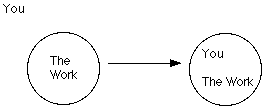
The following information may be found in: "Sound Ways of Knowing:
Music in the Interdisciplinary Curriculum" by Barrett, McCoy, and Veblen.
New York: Schirmer Books, 1997.
Barret, McCoy, and Veblen discuss the process of moving from being a passive observer to creating a sense of being fully "within a work--engaged in comprehension, personal response, or dialogue with the work or the impulses of its creator. Recall a time when your senses were heightened and your perceptions were clear while performing, listening to, creating, evaluating, viewing, or examining a song, play, poem, sculpture, dance, or other work"

"Thomas Moore, in his book Care of the Soul (1992), asserts that 'we'll feel empty if everything we do slides past without sticking.' The arts are important because they arrest attention and 'invite... us into contemplation---a rare commodity in modern life. In that moment of contemplation art intensifies the presence of the world" (p. 286). When we are participating in the arts as creator, performer, or perceiver, we are able 'to see more in our experience, to hear more on normally unheard frequencies, to become conscious of what daily routines, habits and conventions have obscured' (Greene, 1995, p. 379)
"Georgia O-Keeffe, who painted spectacular canvas-filling flowers, said, 'Still--in a way--nobody sees a flower--really--it is so small--we haven't time--and to see takes time, like to have a friend takes time'"
"To derive full value from the arts, we must be willing to become actively engaged with them over time."
"The artist, through visual images, melodies, physical gestures, or poetic language, not only helps us clarify our thoughts about life experiences, but also helps us distill and intensify the feelings of joy, sorrow, wonder, or amusement we associate with those experiences."
"Words seem like straightjackets when compared with the fluid, lively, and simultaneous elements of a folk dance, jazz quartet, opera chorus, or grand finale in the musical theater."
"Leonard Bernstein (1959), as gifted as anyone in pointing the way to musical experience through words, resigned himself to 'joining the long line of well-meaning but generally doomed folk who have tried to explain the unique phenomenon of human reaction to organized sound.'"